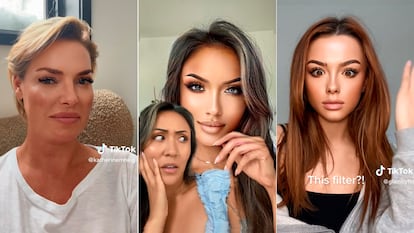‘Looking at your real face in a mirror could scare you’: How filters hurt our mental and physical health
A new ‘beautifying’ filter on TikTok has already been used 16 million times since it was launched in February. Experts are warning about the harmful impacts of using digital tools to create unrealistic faces and bodies

Cosmetic surgeons nostalgically remember the days when their patients would come to their offices with a photo of, say, Angelina Jolie and say: “I want to look like this.” The response was as simple as handing back the photo and telling them: “That’s nice, but you’re not Angelina Jolie.”
Two decades later, first meetings with patients have become a bit more complicated. Patients now pull out their phones and show their own filtered faces. “I want this,” they keep saying… but now it’s harder to convince them that it’s impossible.
The argument of “you’re not Angelina Jolie” is tougher to accept in the time of augmented reality. Patients arrive at consultations after having already lived (online) with the best version of their facial features. On screen, they were more beautiful, younger and smoother… and they want to pay to have all of that in real life.
“They come after having carefully studied their own faces… they’ve tried out various filters, they know [what makes them] look better and they arrive with the diagnosis already made. They [tell us] that they want to increase the size of their lips or raise the cheekbones…” says Dr. Gema Pérez Sevilla, a cosmetic surgeon and specialist in oral and maxillofacial surgery.
“Sometimes they ask for truly strange things that cannot be achieved, such as changing the position of their eyes.”
On Instagram, Dr. Pérez Sevilla has just published a video with her face passed through TikTok’s Bold Glamour filter. “It’s not healthy to show everyone [features] that aren’t ours and, on top of that, are reproducible en masse for the entire world,” she tells her 45,000 followers.
While TikTok hasn’t confirmed it, experts believe that Bold Glamour applies a type of artificial intelligence that rejuvenates faces with precision and – what’s even more perverse – with some realism. The filter instantly shows you the best version of yourself. It erases everything you don’t want to see: wrinkles, sunken cheekbones, dark circles, open pores, slack chin, dull eyes, sparse eyelashes. And it does so in real time, without fail.
This mental trap hooks people. Since the filter was launched in February, it has already been used more than 16 million times. The AI it uses compares each face against a database of infinite faces. Then, using machine learning technology, it builds the best possible version of the filtered face.
If the resulting esthetic is impressive, the realism is even more so: this elevated version of yourself doesn’t fail even when you move your face, or when a hand enters the visual field (traditional filtered faces are generally betrayed by hand movements).
The phenomenon of people asking for surgical procedures to look like their digitally-filtered image was coined “Snapchat dysmorphia” (as the first filters came via that platform) by Dr Tijion Esho, a plastic surgeon with clinics in London and Newcastle.
In 2018, a study published in JAMA Facial Plastic Surgery suggested that filtered images blur the line between reality and fantasy and can trigger body dysmorphic disorder – a mental disorder characterized by an obsession with imagined physical imperfections.
“Until the filters arrived, we had never faced the best version [of ourselves]... this is harmful because it leads to a comparison in which reality always loses out. The perception of our brain is altered so that, when you see yourself without makeup, you feel a certain rejection towards your own image, because the brain also prefers the best option,” affirms Dr. Pérez Sevilla.
Every day, Paz Torralba – director of The Beauty Concept clinics – has to do “didactic work” to gain the trust of patients who arrive with “very high expectations and an unreal image – distorted by filters – and who have serious self-esteem and self-perception problems.” Both surgeons concede that the filters have, to some extent, altered the practice of their profession.
According to Snapchat, more than 90% of young people in the United States, France and the United Kingdom use its augmented reality (AR) filters. Meta, meanwhile, indicates that more than 600 million people have used its AR effects on Facebook and Instagram. Also, this habit is starting earlier and earlier. A 2020 investigation by the Dove Self-Esteem Project says that, by the age of 13, 80% of girls have already used a filter to alter their appearance.
The Bold Glamour filter is too new for there to be any scientific evidence regarding its impact on self-esteem. But those earlier filters – which now seem rudimentary – have been scrutinized for damaging mental health. The available scientific evidence shows that the farther away the filtered image is from our self-perception, the worse we feel. It also suggests that heavy use of filters speeds up the first visit to the plastic surgeon.
Therapist Adriana Royo has very young patients – under the age of 20 – who, when they’re sick, put on a filter to appear before their TikTok audience.
“They don’t show their worst face… although they’ll tell their followers that they’ve had a bad day and even cry in front of their audience. [This all] ends up impacting the brain. What I’ve seen in my last 10 years of clinical practice is that anxiety and depression are closely linked to the constant search for perfection.”
In 2021, a study from the City University of London explored the mental health issues in 175 young women and non-binary people ages 18 to 30. More than 90% of young women used filters or heavily edited their photos. The most popular filters were those that shed several pounds and whitened teeth, while offering an even, tanned, glowing skin tone. These young women used filters to define their jaws, alter their noses, enlarge the eyes and fill in lips.
According to the authors, the younger girls admitted to being under “considerable pressure” to appear “happy, fun and [having] a very active social life.” All of this falls within the notion of being “beautiful without effort,” which hides the filters and the enormous amount of hours spent editing. The researchers also found that people with low self-esteem and a poor self-image were more likely to use filters – behavior that reinforced negative beliefs about their appearance.
Other research has also shown that filter abuse increases feelings of body dissatisfaction. “[Users] are no longer just comparing their appearance to professionally produced pictures of celebrities, but harshly judging themselves against their own filtered selfies,” the authors write, noting that this relentless scrutiny wreaks havoc on self-esteem.
The obsession with comparing and judging yourself on social media increases filter dysmorphia– a disconnect between actual appearance and edited images deemed fit to share with the world. This alienation from reality was observed by researcher Ashna Habbid in her work on how Snapchat filters affected young women, published in 2022.
Habbid described a ritual: “You start finding flaws that no one else notices… for example, the shape of the face or the width of the forehead. To correct these supposed imperfections, [users] frequently look at their old photos. They then spend a lot of time taking selfies over and over again, editing them until they achieve the ideal look. Ultimately, they’re trying to change their appearance to get closer and closer to their filtered version. It’s very likely that there are people who never publish a photo that hasn’t been passed through the image wash.”
Other studies suggest that the detailed and excessive comparison of manipulated faces and bodies generates a type of self-objectification that could explain why intensive filter users opt, very quickly, for the scalpel to “correct” themselves. American plastic surgeons warn that unlike other static filters, TikTok’s Bold Glamour smoothes pores and adds lashes and “remains undetectable to the untrained eye.” In this hyperrealism lies its perversion.
TikTok hasn’t released any information about the design of Bold Glamour, but the company has asked its content-makers – via an official statement – to be “honest” and mark their content every time they use this filter. In France – as of Friday – this is mandatory. All influencers will have to tell their audiences about the use of “beautification filters” – as explained by Minister of the Economy Bruno Le Maire – to “limit its destructive psychological effects.” The law is part of a set of behavior guidelines for influencers and content creators.
The confusion between reality and fiction can disrupt identity, writes Renee Engeln, director of the Body and Media Lab at Northwestern University. “Looking at your real face in a mirror suddenly scares you. You’ll never like yourself again. You’ll always find something that needs to be corrected. Your interest in plastic surgery and other procedures will soon increase,” the researcher warns.
Paz Torralba and Pérez Sevilla already notice that their patients have become more demanding and have very high expectations. They no longer want to be Angelina Jolie – they want to be a real-life clone of their airbrushed TikTok clone.
Sign up for our weekly newsletter to get more English-language news coverage from EL PAÍS USA Edition
Tu suscripción se está usando en otro dispositivo
¿Quieres añadir otro usuario a tu suscripción?
Si continúas leyendo en este dispositivo, no se podrá leer en el otro.
FlechaTu suscripción se está usando en otro dispositivo y solo puedes acceder a EL PAÍS desde un dispositivo a la vez.
Si quieres compartir tu cuenta, cambia tu suscripción a la modalidad Premium, así podrás añadir otro usuario. Cada uno accederá con su propia cuenta de email, lo que os permitirá personalizar vuestra experiencia en EL PAÍS.
¿Tienes una suscripción de empresa? Accede aquí para contratar más cuentas.
En el caso de no saber quién está usando tu cuenta, te recomendamos cambiar tu contraseña aquí.
Si decides continuar compartiendo tu cuenta, este mensaje se mostrará en tu dispositivo y en el de la otra persona que está usando tu cuenta de forma indefinida, afectando a tu experiencia de lectura. Puedes consultar aquí los términos y condiciones de la suscripción digital.









































